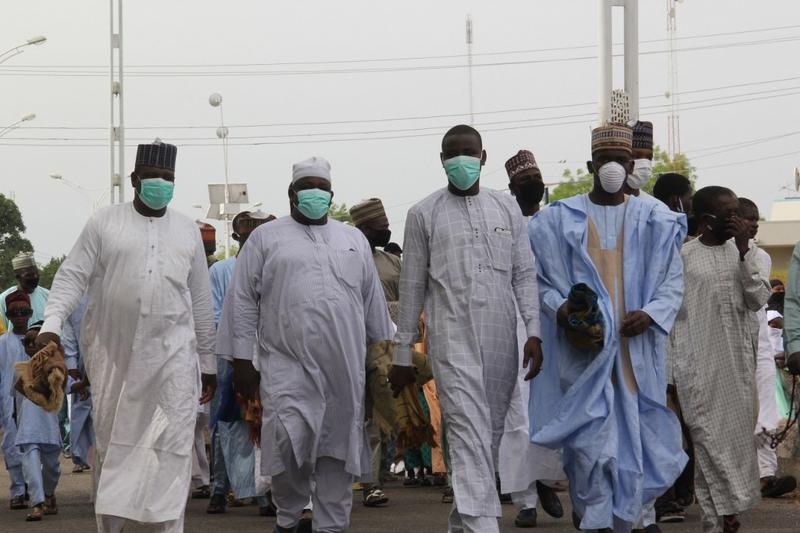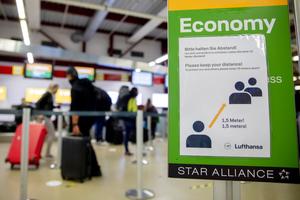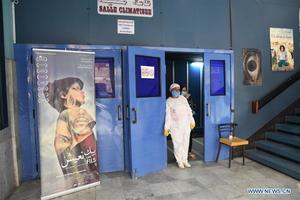 In this file photo, male worshippers wear face masks as they arrives at Ramat Square Eid grounds in Maiduguri ahead of the Eid al-Fitr prayer on May 24, 2020. (AUDU MARTE / AFP)
In this file photo, male worshippers wear face masks as they arrives at Ramat Square Eid grounds in Maiduguri ahead of the Eid al-Fitr prayer on May 24, 2020. (AUDU MARTE / AFP)
PARIS / BRUSSELS / MILAN / BOGOTA / ACCRA / LONDON / CAIRO / BERLIN / MADRID / BUENOS AIRES / PRGAUE / ATHENS / MOSCOW / BELGRADE / OSLO - Nigerian doctors began an indefinite nationwide strike over the lack of protective equipment against the coronavirus, as the number of new infections in the West African nation continued to climb.
Doctors are demanding access to “appropriate” personal protective equipment for all health-care workers, along with the payment of revised hazard allowances, the National Association of Resident Doctors of Nigeria said Monday
Doctors are demanding access to “appropriate” personal protective equipment (PPEs) for all health-care workers, along with the payment of revised hazard allowances, the National Association of Resident Doctors of Nigeria said Monday.
They also asked to be paid all owed salary arrears and an end to the harassment and assault of medical workers by security agencies. The group asked its members to stop working until their requests are met.
The increase in the number of new COVID-19 cases in Nigeria has doubled to more than 400 per day in the past week. So far, the country, Africa’s most populous, has recorded 16,085 infections and 420 deaths, with the nation’s capital of Abuja and two largest cities -- Lagos and Kano -- reporting almost 10,000 cases in total.
Global tally
Coronavirus cases worldwide on Monday topped 7.9 million while global COVID-19 deaths surpassed 433,000, according to data from Johns Hopkins University.
The United States is the hardest-hit country, with over 2 million cases and more than 115,000 deaths.
Countries with over 200,000 cases also include Brazil, Russia, Britain, India, Spain, Italy and Peru.
The number of confirmed COVID-19 cases across the African continent surpassed 232,815 as of Sunday morning and the death toll rose to 6,244, the Africa Center for Disease Control and Prevention (Africa CDC) said.
Argentina
Argentina's President Alberto Fernandez on Sunday said he was "concerned" by the rapid spread of COVID-19.
Fernandez called for a return to stricter social distancing measures in public transit and recreational activities in the Buenos Aires metropolitan area (AMBA), the epicenter of the country's outbreak.
Lockdown measures launched on March 20 and in place through June 28 are "the only solution", he noted, as no vaccine or cure exists yet.
Argentina on Saturday reported a daily increase of 1,531 cases, the biggest single-day rise in infections since the first case was detected here on March 3.
So far, a total of 30,295 people have tested positive for the virus and 815 people have died from the disease in the country.
Brazil
Brazil has registered 867,624 confirmed cases of the novel coronavirus, with 17,110 new cases since yesterday, the Health Ministry said on Sunday.
The death toll rose to 43,332, with another 612 deaths since yesterday.
Chile
Chile’s government reached a deal with opposition lawmakers for a US$12 billion stimulus package over the weekend as infections hit a record and the health minister quit.
The new measures will boost income for poor families and the unemployed, subsidize job creation and cut taxes for small and medium-sized companies, the government said.
Chile has reported 174,293 cases of COVID-19, with 3,323 deaths, as of Sunday. In the past 24 hours ending 9 pm Saturday, 6,938 new cases were detected and 222 more deaths were reported, the country's health ministry said.
Chilean President Sebastian Pinera on Saturday replaced his health minister, Jaime Manalich, who had come under fire from a range of sectors for his handling of the epidemic, and appointed surgeon Enrique Paris to head the ministry.
Colombia
Confirmed coronavirus cases in Colombia have risen to over 50,000, the country's Health Ministry said on Sunday.
So far, Colombia has reported 50,939 cases of the coronavirus and 1,667 deaths.
At a news conference on Sunday, Bogota Mayor Claudia Lopez declared new restrictions in which residents can only leave home to go shopping or access financial services on days corresponding with the numbers on their ID cards.
Strict two-week quarantines will also be imposed in a number of Bogota's districts where infection rates are high.
Czech Republic
The number of coronavirus cases rose to more than 10,000 in the Czech Republic, Health Ministry data showed on Monday.
The country of 10.7 million has 10,024 confirmed cases as of the end of Sunday, with 329 deaths and 7,226 recovered.
The daily rise in case numbers has been in the range of 31-74 over the past two weeks.
Czech authorities opened their borders to travel from most EU countries earlier this month and it has raised the limit for public gatherings to 500 people.
Egypt
Egypt will reopen all its airports for scheduled international traffic on July 1, the civil aviation minister said on Sunday, after suspending regular commercial flights in March because of the coronavirus outbreak.
Mohamed Manar Anba said at a news conference that foreign tourism would be limited to resorts in three coastal provinces, after the government said on Thursday it would reopen Egypt's main seaside resorts for international flights and foreign tourists from July 1.
Anba and Tourism Minister Khaled al-Anani, who joined the news conference, said travelers from countries with high rates of coronavirus infections, based on World Health Organization (WHO) assessments, need to be tested before coming to Egypt.
Egypt has registered 44,598 cases of the coronavirus and 1,575 deaths.
On Sunday, the health ministry reported more than 1,600 new cases for the second straight day and a daily record of 91 deaths, according to a statement.
Eritrea
The number of confirmed cases of COVID-19 in Eritrea has risen to 65 after the nation recorded 24 new cases of COVID-19 within a 24 hours period, the Eritrea Ministry of Health (MoH) reported on Sunday morning.
It was by far the highest daily increase in the Red sea country.
The ministry also said 7,158 Eritrean nationals had returned home through land and sea routes from neighboring countries in the past two months, with 3,153 still remaining in 47 quarantine centers throughout the country.
The ministry said 39 patients have recovered fully and have been discharged from hospitals while the remaining 26 were still receiving medical treatment.
European Union
European nations eased border controls on Monday as coronavirus cases declined after three months of lockdown, with Germans escaping to holiday destinations and French people streaming into Belgium to buy cheap cigarettes.
But Spain's continued closure, a patchwork of quarantine rules and remote-working mean pre-crisis travel levels are a way off.
Spain is permitting entry to a select group of holidaymakers from Germany as the Madrid government works out how to make mass tourism work now. Sunseekers queued at Düsseldorf to board tour operator TUI's flight to Mallorca.Greek airports allowed more international flights as the country sought to salvage its summer, German tourists flocking to neighboring Denmark caused an 8 km queue and Italians popped into France to buy lottery scratch cards.
The European Commission on Monday launched a site, called "Re-open EU", giving information on travel to and within EU countries, what coronavirus-related rules apply, and whether facilities such as hotels and beaches are open.
European officials hope the lifting of internal border controls will allow a gradual reopening to other countries from July and resuscitate a tourism industry that flatlined during the lockdown.
However, it will not be a return to unfettered travel for the Schengen area's 420 million inhabitants.
ALSO READ: Norway allows travel throughout Nordics, except Sweden
The Czech Republic has a traffic-light system, barring entry for tourists from 'orange' or 'red' countries such as Portugal and Sweden.
Denmark will allow in tourists from Iceland, Germany and Norway, but notably not Sweden, on condition they book at least six nights' accommodation.
Britain's two-week quarantine for visitors means Britons will face the same confinement in France.
Finland
Finland is withdrawing the emergency powers act that parliament adopted in March to tackle the coronavirus as the infection rate has slowed and exceptional measures are no longer needed, the prime minister said on Monday.
Sanna Marin said there were no longer legal grounds for the government to keep the emergency legislation and the state of emergency would end at midnight on Monday.
“It doesn’t mean the threat of the virus spreading would be over,” she said.
There were 26 hospitalized COVID-19 patients and only one person in intensive care on Monday across Finland, the government said, adding there had been around 15 to 25 new cases a day for several weeks, totaling at 7,104 on Sunday.
“The emergency powers act, which restricts citizens’ basic rights, cannot remain valid any longer than absolutely necessary,” Justice Minister Anna-Maja Henriksson said.
Marin said certain restrictions, such as those given to restaurants to reduce night-time opening hours and the number of customers they accept indoors, would remain in place but would be enforced through ordinary legislation.
 A smartphone showing French President Emmanuel Macron speaking in a televised address to the nation in Paris, France, June 14, 2020. (GAO JING / XINHUA)
A smartphone showing French President Emmanuel Macron speaking in a televised address to the nation in Paris, France, June 14, 2020. (GAO JING / XINHUA)
France
The worst part of the coronavirus epidemic is behind France, but people must remain vigilant as the virus continues to circulate, Health Minister Olivier Veran said on Monday, adding that testing would continue.
Veran's remarks came a day after President Emmanuel Macron, in a televised address to the nation on Sunday, declared "a first victory" over the coronavirus epidemic, announcing a return to normalcy from Monday across French regions, except for overseas territories.
Restaurants and cafes in Paris will be allowed to reopen fully from Monday, Macron said, the same day France lifts restrictions at its borders for EU travelers, bringing sorely needed relief for the hospitality industry.
In his address, Macron promised that the 500 billion euro cost of keeping companies afloat and people in jobs during the worst downturn since World War II would not be passed to households through higher taxes.
France reported on Sunday nine coronavirus deaths over the previous 24 hours, taking the death toll to 29,407 and marking the fifth day with under 30 fatalities. The number of new cases was up 407, bringing the tally to 157,220.
Germany
Germany's smartphone app to trace coronavirus infections is ready to be launched this week, Health Minister Jens Spahn said on Sunday.
After delays to ensure the bluetooth technology would work at the correct distance, the government says the app will be a vital tool to help avoid a second wave of infections.
Spahn also urged people wishing to go on holiday after European border controls are eased on Monday to be careful and ask themselves whether their trip was necessary.
On Monday, Germany lifts its blanket travel warning for EU nations and Britain, and will replace it with specific travel advice for individual countries and regions.
There were 251 new infections in the 24 hours through Monday morning, bringing the total to 187,518 according to data from Johns Hopkins University. Fatalities increased by eight to 8,801.
The reproduction factor of the virus was at 1.05 on Sunday, according to a daily report by the Robert Koch Institute (RKI).
According to data from RKI on Monday, the number of confirmed cases increased by 192 to 186,461 while the reported death toll rose by four to 8,791.
 A sign at a check-in counter at Berlin-Tegel Airport indicates that the minimum distance of 1.5 meters must be observed in Berlin, Germany, June 15, 2020. (CHRISTOPH SOEDER / DPA VIA AP)
A sign at a check-in counter at Berlin-Tegel Airport indicates that the minimum distance of 1.5 meters must be observed in Berlin, Germany, June 15, 2020. (CHRISTOPH SOEDER / DPA VIA AP)
Ghana
Ghana's Health Minister Kwaku Agyemang-Manu has tested positive for the coronavirus, Ghanaian President Nana Addo Dankwa Akufo-Addo said late Sunday.
Akufo-Addo said the minister was in a stable condition.
The president also announced the death of Kobina Sam, mayor of Sekondi-Takoradi, as a result of COVID-19 related complications.
As of Sunday night, Ghana has recorded 11,964 cases of COVID-19 with 54 deaths.
Akufo-Addo confirmed that final year students in secondary schools and universities would resume classes on Monday.
Greece
Greece reopened its main airports to more international flights on Monday, hoping to kick-start its vital tourism sector after three months in lockdown.
Passengers arriving from airports deemed high-risk by the EU's aviation safety agency will be tested for the coronavirus and quarantined up to 14 days, depending on the test result. Restrictions remain for passengers from Britain and Turkey. Arrivals from other airports will be randomly tested.
From the picturesque island of Santorini, Prime Minister Kyriakos Mitsotakis told reporters on Saturday that his priority was to make Greece the safest destination in Europe.
Restrictions on movement imposed in March helped Greece contain the spread of COVID-19 infections to just above 3,000 cases, a relatively low number compared with other EU countries.
 In this handout photo provided by the Prime Minister's Office, Greek Prime Minister Kyriakos Mitsotakis, centrer, visits the town of Fira in Satorini, Greece, on June 13, 2020. (DIMITRIS PAPAMITSOS / GREEK PRIME MINISTER'S OFFICE VIA AP)
In this handout photo provided by the Prime Minister's Office, Greek Prime Minister Kyriakos Mitsotakis, centrer, visits the town of Fira in Satorini, Greece, on June 13, 2020. (DIMITRIS PAPAMITSOS / GREEK PRIME MINISTER'S OFFICE VIA AP)
Italy
Deaths from the COVID-19 epidemic in Italy climbed by 44 on Sunday, the Civil Protection Agency said, while the tally of new cases increased by 338.
The total death toll now stands at 34,345, the agency said, the fourth highest in the world after those of the United States, Britain and Brazil.
The number of confirmed cases amounts to 236,989, the seventh highest global tally behind those of the United States, Russia, Brazil, Spain, Britain and India.
People registered as currently carrying the illness fell to 26,274 from 27,485 the day before.
Earlier on Sunday, it was announced that Minister of Health Roberto Speranza signed a cooperation agreement with his counterparts in France, Germany, and the Netherlands for the co-production of a vaccine against COVID-19 when it is available. The deal guarantees that at least 30 million doses of the vaccine will be made available for Italy, the equivalent for around half of the country's population.
Kenya
Kenya is on the cusp of entering the peak of COVID-19 infections as healthcare facilities grapple with a high burden of other infectious diseases that are endemic in the country.
"It is clear that COVID-19 cases will continue rising till we reach the much-anticipated peak in July or August as the latest modeling indicate," said Rashid Aman, chief administrative secretary of the Ministry of Health.
"We have also observed that infections are moving from urban, metropolitan areas to rural counties. This trend is worrying and there is a need for urgent intervention to ensure the vulnerable are protected," he added.
The health ministry on Sunday announced 137 new COVID-19 cases, raising the tally to 3,594, while the death toll surpassed the 100 mark.
ALSO READ: Jobs, investment lost: Deserted Africa safaris leave mounting toll
Mexico
Mexico's Health Ministry reported 4,147 new confirmed coronavirus infections along with 269 additional fatalities on Sunday, bringing the total in the country to 146,837 cases and 17,141 deaths.
The government has said the real number of infected people is likely significantly higher than the official count.
Montenegro
Three weeks after declaring it was free of the coronavirus, Montenegro has reported a new COVID-19 case - a person who arrived from neighboring Bosnia.
It was the first new infection reported in the tiny Balkan country since May 5.
The Institute for Public Health, which is tasked with combating the new coronavirus, said the infected patient was in self-isolation in the Balkan country's capital, Podgorica.
Montenegro has so far reported 325 confirmed cases and nine deaths. Prime Minister Dusko Markovic declared Montenegro coronavirus-free on May 25.
Mozambique
Mozambique registered 30 new COVID-19 cases and one death in the last 24 hours, said the country's Director-General of the National Institute of Health (INS), Ilesh Jani on Sunday.
"The cumulative number of positive cases has gone up from 553 to 583," Jani said, adding that there were with no new recoveries reported in the past 24 hours.
Norway
Norway will halt its COVID-19 track and trace app and delete all data collected so far after criticism from the Norwegian Data Protection Authority, the Norwegian Institute of Public Health (NIPH) said on Monday.
The app was introduced by some Norwegian authorities to limit the transmission of the coronavirus.
The data protection watchdog said on Friday that considering the low spread of the infection, among other issues, collecting data through the app could no longer could be seen as reasonable amid privacy concerns.
Russia
Russia on Monday reported 8,246 new cases of the coronavirus, taking the nationwide tally of infections to 537,210, the country's coronavirus crisis response centre said.
It said 143 people had died from the virus in the past 24 hours, taking Russia's overall death toll to 7,091.
Moscow, the country's worst-hit region, reported 1,359 newly confirmed cases, taking its tally of infections to 207,264.
Rwanda
The Rwandan Ministry of Health is set to expand testing for COVID-19 in Kigali and other areas, with the aim of finding out the level of transmission of the virus days after the government eased restrictions on movement within the country, an official said on Sunday.
"From Monday June 15 the ministry of health will launch expanded research with mass testing of coronavirus in Kigali and other districts aimed to find out whether easing of restrictions on movement of passenger motorcycles could have posed a particular problem," Sabin Nsanzimana, director general of Rwanda Biomedical Center, said on Rwanda Television news program.
The ministry has increased testing capacity from about 1,000 to more than 2,000 per day, he said.
The ministry on Sunday reported 41 new COVID-19 cases, the highest daily increase since the outbreak of the virus in March in the country, bringing the tally to 582, with 332 recoveries and two deaths.
Senegal
Senegalese Ministry of Health and Social Action reported on Sunday 94 new confirmed cases of COVID-19 in the past 24 hours, bringing the tally in Senegal to 5,090 cases.
After a daily record of 27 imported cases of COVID-19 on Saturday at Blaise Diagne International Airport, only one imported case was recorded on Sunday.
The number of patients discharged from hospitals increased by 116 to 3,344, while the number of patients in intensive care units remains at 22.
The death toll remained at 60.
South Africa
South Africa reported Sunday a record 4,302 new cases, bringing the total to 70,038. Cases in the central Gauteng region, which includes Johannesburg, the largest city, and Pretoria, the capital, continue to surge, rising at the fastest pace among nine provinces.
Cape Town, the main tourist hub, and the surrounding Western Cape province, remain the nation’s epicenter for the pandemic, with 61 percent of infections. The national death toll is 1,480.
Police Minister Bheki Cele said the COVID-19 pandemic has taken its toll on the South African Police Service (SAPS), claiming the lives of 14 officers and infecting 1,685 others.
Spain
Spain reopened to a select group of German tourists on Monday in a pilot project which will bring 10,000 holidaymakers to the Balearic Islands to find out how mass tourism can work in a time of coronavirus.
Dozens of mask-wearing sunseekers queued at Duesseldorf airport on Monday morning to board tour operator TUI's flight to Palma de Mallorca, eager to test arrangements for socially distanced holidaymaking two weeks before Spain fully reopens.
Spain will allow the entry of visitors from the EU and the open-border Schengen area, which also includes non-EU countries such as Switzerland and Norway from June 21, Spanish Foreign Minister Arancha Gonzalez Laya tweeted Sunday.
Visitors from outside the EU or Schengen area will be able to visit Spain from July 1, though that will hinge on their country's public health situation, Laya said.
British visitors would be able to travel to Spain from June 21 since Britain is still considered part of the EU, a Spanish foreign ministry source said.
Prime Minister Pedro Sanchez said Spain's land border with Portugal would remain closed till July 1 because Lisbon had requested it.
Spain's COVID-19 death toll has remained unchanged for a week at 27,136, according to the data published by the Ministry of Health, Consumer Affairs and Social Welfare on Sunday. The ministry reported 48 new cases, taking the tally to 243,928.
Sudan
Sudan will keep its airports closed to international and internal scheduled commercial flights for another two weeks until June 28, a spokesman for the country's civil aviation authority told Reuters on Sunday.
Sudan shut the airports in March as part of measures to curb the spread of the coronavirus pandemic. It has been reviewing the closure every two weeks.
Airports are open only for flights transporting cargo, humanitarian aid, oil organisations' workers or evacuating foreigners, said Abdul Hafiz Abdul Rahim, the SCAA spokesman.
Sudan had reported 7,007 coronavirus infections as of Thursday, including 447 deaths, the health ministry said.
Sweden
Sweden’s Prime Minister Stefan Lofven rejected criticism of the country’s COVID-19 strategy, amid accusations that the softer lockdown his government chose has resulted in one of the world’s highest mortality rates.
“We’ve followed the same main strategy as others,” Lofven said in an interview on state broadcaster SVT on Sunday evening. “Which in other words means keeping the contagion at levels that the health-care system can handle.”
Lofven said that “it’s too early to draw any definitive conclusions about the success of our strategy,” despite the high death rate. The number of COVID-related deaths now totals 4,874 in Sweden, dwarfing the 597 registered in neighboring Denmark and 242 in Norway.
According to Lofven, Sweden’s excess mortality rate “is normal for the time year.” He also said methods for tracking COVID death rates vary between countries.
 A worker in protective gear stands at the entrance of a cinema hall in Tunis, Tunisia, on June 14, 2020 as cinemas across the country reopened after being closed for over three months due to the COVID-19 pandemic. (ADEL EZZINE / XINHUA)
A worker in protective gear stands at the entrance of a cinema hall in Tunis, Tunisia, on June 14, 2020 as cinemas across the country reopened after being closed for over three months due to the COVID-19 pandemic. (ADEL EZZINE / XINHUA)
Tunisia
Tunisian Prime Minister Elyes Fakhfakh declared Sunday that "Tunisia is preparing to open its air, land and sea borders from June 27," noting that tourists visiting Tunisia would have to respect mandatory confinement in hotels.
"Tunisia has won its fight against the coronavirus disease thanks to the country's national unity," Fakhfakh said in an interview broadcast on Tunisian private channel Attasia.
"We made efforts and we were able to achieve a victory," he said, adding that "Tunisia has contained the virus but care must be taken in order to completely eradicate the disease."
The Ministry of Health said Sunday two new COVID-19 cases were reported Sunday, bringing the total number of cases to 1,096.
 People queue outside the Niketown shop in London, June 15, 2020. (MATT DUNHAM / AP)
People queue outside the Niketown shop in London, June 15, 2020. (MATT DUNHAM / AP)
UK
Britain’s government hopes to complete a review into whether the country should stick to a social distancing measure of keeping people two meters apart in the coming weeks, a spokesman for Prime Minister Boris Johnson said on Monday.
The review into the two-metre rule comes after some businesses, especially in the hospitality industry, complained they could not return profits if customers had to stand far apart, citing other countries where the distances are smaller.
READ MORE: UK scientists defy Johnson to speak out on virus failures
US
New coronavirus cases and hospitalizations in record numbers swept through more US states, including Florida and Texas, as most push ahead with reopening and President Donald Trump plans an indoor rally in Tulsa, Oklahoma.
Coronavirus cases in the US increased by 23,191 from the same time Saturday to 2.08 million, according to data collected by Johns Hopkins University and Bloomberg News.
Alabama reported a record number of new cases for the fourth day in a row on Sunday. Alaska, Arizona, Arkansas, California,Florida, North Carolina, Oklahoma and South Carolina all had record numbers of new cases in the past three days, according to a Reuters tally.
Many state health officials partly attribute the increase to gatherings over the Memorial Day holiday weekend in late May.
New York Governor Andrew Cuomo threatened to roll back reopening in areas where social distancing and other protocols put in place during the COVID-19 pandemic are being violated. Cuomo said that some 25,000 complaints of violations have been filed against businesses across the state since it launched a phased reopening in May.
READ MORE: Virus: US cases rise at two-week high


